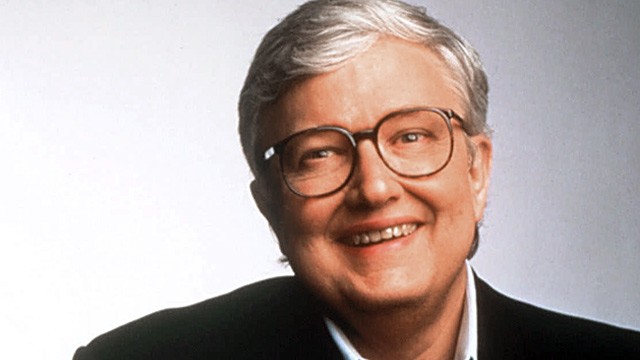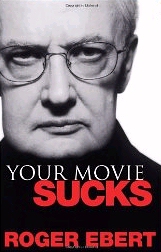
I really loved Roger Ebert. I started watching his movie reviews on TV back when I was in high school, and for decades to come I thought he had the greatest job in the world. He’d just watch movies, and then tell people whether he’d liked them! But Roger Ebert was also an excellent writer, and fortunately, he’s left behind some fantastic Kindle ebooks!
In fact, Ebert was a pioneer in Kindle ebooks. Just two days before his death on Thursday, Ebert announced that he was re-launching his popular web site as “Ebert Digital” — and he’d already begun marketing his movie reviews through Amazon’s Kindle Store. He was always “the people’s critic,” and he’d found a clever way to keep his prices low. Ebert started releasing his movie reviews in special smaller collections which he called “Ebert’s Essentials.” Each ebook had a unique theme, which somehow made them that much more appealing.
For example, six months ago Roger released “30 Movies to Get You Through the Holidays”, a 94-page collection reviewing movies “to watch together to celebrate the season or movies to watch alone to survive the season!” And less than a year ago, the theme was “25 Great French Films” — which included a special treat. If you read the ebook using one of Amazon’s Kindle apps on an iPad, iPod, or iPhone, it included video clips from most of the movies (taken from their promotional trailers). And best of all, both of these ebooks cost less than four dollars.
There were other interesting bargain-priced collections too. Ebert titled his collection about film noir “27 Movies from the Dark Side.” If you wanted something more inspirational, there was also “33 Movies to Restore Your Faith in Humanity”. Even if you’d just been dumped by your boyfriend or girlfriend, Roger Ebert had recommendations for you. Last May he released a special collection of reviews which he called “25 Movies to Mend a Broken Heart.”
Of course, my favorite book by Roger Ebert was probably his collection of negative reviews — “Your Movie Sucks” — and there’s a funny story about where that title came from. Comedian Rob Schneider had taken out full-page ads in Hollywood newspapers back in 2005 just to attack movie critic Patrick Goldstein, who had sharply criticized Schneider’s recent movie Deuce Bigalow: European Gigolo. Schneider mockingly suggested that Goldstein wasn’t qualified to critique the movie, since his movie reviews had never won a Pulitzer Prize. “As chance would have it, I have won the Pulitzer Prize,” Ebert wrote in his own review in the Chicago Sun-Times, “and so I am qualified. Speaking in my official capacity as a Pulitzer Prize winner, Mr. Schneider, your movie sucks.”

I purchased a copy of the ebook, and soon found I was tempted to highlight nearly every single sentence, because each one of them made me laugh out loud. In a forgotten movie called The 51st State, Samuel L. Jackson played a character named Elmo McElroy. Ebert couldn’t resist warning jokingly that “Only eight of the seventy-four movies with characters named Elmo have been any good…” And writing about The Fantastic Four, he asks, “If you could burn at supernova temperatures, would you be able to stop talking about it? I know people who won’t shut up about winning fifty bucks in the lottery!”
But the best thing about Roger Ebert was that he could make me laugh and smile while simultaneously making some very thoughtful points. In one of his last books — a memoir titled “Life Itself” — he wrote a warm and poignant passage with his theory on why dogs beg for food at the table. “I never met a dog that didn’t beg at the table. If there is a dog that doesn’t, it has had all the dog scared out of it. But a dog is not a sneak thief like a cat. It doesn’t snatch and run, except if presented with an irresistible opportunity. It is a dinner companion. It is delighted that you are eating, thinks it’s a jolly good idea, and wants to be sure your food is as delicious as you deserve. You are under a powerful psychological compulsion to give it a taste, particularly when it goes into convulsions of gratitude. Dogs remember every favor you ever do for them and store those events in a memory bank titled Why My Human Is a God.”
Of course, that passage suggests some of the fondness that went into the cookbook he released in 2010 — which represented a new kind of triumph for the film critic. Ebert’s personal web site had also become hugely popular, and in 2008, a post about rice cookers had generated hundreds of comments. So the 68-year-old writer collected together the best recipe suggestions and comments into a charming 128-page book which, according to its description on Amazon, also includes Ebert’s “discerning insights and observations on why and how we cook”. The book was published just two years ago, showing the famous critic could share his enthusiasm about more than just movies. And a writer at Salon also shares a story about the book’s other significance.
Four years earlier, Ebert fought a fight against cancer which included the removal of his lower jaw. This left the writer unable to speak or eat, which he wrote about openly, treating it like another life experience which held its own fascination. Writing a cookbook “became an exercise more pure, freed of biological compulsion,” he told Salon’s interviewer in 2008. He added that “I think I was somewhat frustrated by not being able to eat and I wanted to live vicariously” — and she notes that he typed the words into his laptop computer, which then spoke them out loud on his behalf.
ABC News ran an article Thursday which added this too onto Roger Ebert’s list of lifetime achievements. “By showing the ups and downs of cancer over the last decade, Ebert…illustrated that cancer patients can continue with life, even if that life is forever changed, said Dr. Michael Neuss, chief medical officer at Vanderbilt-Ingram Cancer Center, who was not involved with Ebert’s care.
“I think he broadened our understanding of cancer based on his incredible courage and incredible strength and genuine demeanor through this tough time.
“It has to show people that we do treat cancer patients and that things do happen, but you keep going.”
All of Roger Ebert’s Kindle ebooks are available at tinyurl.com/EbertEbooks